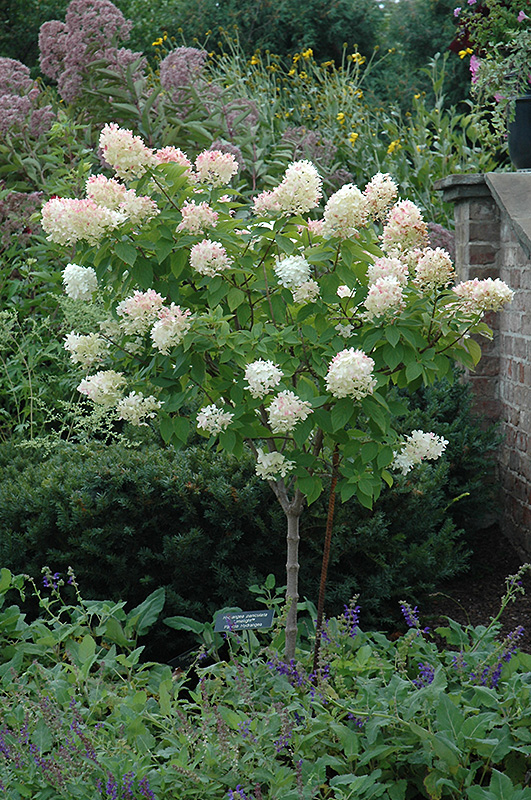Plant Library
Limelight Hydrangea (tree form)
Hydrangea paniculata 'Limelight (tree form)'
Height: 6 feet
Spread: 7 feet
Sunlight:
![]()
![]()
![]()
Hardiness Zone: 4
Description:
This selection is grafted onto a standard to raise the flowers to eye level, features enormous, dense upright panicles of flower heads that start out a soft lime green, fading over the summer to white and finally brown in fall
Ornamental Features
Limelight Hydrangea (tree form) features bold conical lime green flowers with white overtones at the ends of the branches from mid summer to late fall. The flowers are excellent for cutting. It has green deciduous foliage. The pointy leaves do not develop any appreciable fall color.
Landscape Attributes
Limelight Hydrangea (tree form) is a deciduous dwarf tree, selected and trained to grow in a small tree-like form with the primary plant grafted high atop a standard. Its relatively coarse texture can be used to stand it apart from other landscape plants with finer foliage.
This is a high maintenance dwarf tree that will require regular care and upkeep, and is best pruned in late winter once the threat of extreme cold has passed. It has no significant negative characteristics.
Limelight Hydrangea (tree form) is ideal for use as a garden accent or patio feature, and is recommended for the following landscape applications;
- Accent
- General Garden Use
- Container Planting
Planting & Growing
Limelight Hydrangea (tree form) will grow to be about 6 feet tall at maturity, with a spread of 7 feet. It tends to be a little leggy, with a typical clearance of 3 feet from the ground, and is suitable for planting under power lines. It grows at a medium rate, and under ideal conditions can be expected to live for 40 years or more.
This dwarf tree performs well in both full sun and full shade. It prefers to grow in average to moist conditions, and shouldn't be allowed to dry out. It is not particular as to soil type or pH. It is highly tolerant of urban pollution and will even thrive in inner city environments. Consider applying a thick mulch around the root zone in winter to protect it in exposed locations or colder microclimates. This is a selected variety of a species not originally from North America.
Limelight Hydrangea (tree form) is a fine choice for the yard, but it is also a good selection for planting in outdoor pots and containers. With its upright habit of growth, it is best suited for use as a 'thriller' in the 'spiller-thriller-filler' container combination; plant it near the center of the pot, surrounded by smaller plants and those that spill over the edges. It is even sizeable enough that it can be grown alone in a suitable container. Note that when grown in a container, it may not perform exactly as indicated on the tag - this is to be expected. Also note that when growing plants in outdoor containers and baskets, they may require more frequent waterings than they would in the yard or garden. Be aware that in our climate, most plants cannot be expected to survive the winter if left in containers outdoors, and this plant is no exception. Contact our experts for more information on how to protect it over the winter months.
Disclaimer - This Plant Finder tool is an online resource representing many of the varieties that we carry over the course of the season, and is intended for informational purposes only. Inventory varies seasonally, so we cannot guarantee that every plant will be in stock at all times - please contact the store directly for availability. It does not include our entire inventory of plants, so be sure to visit our store to see varieties that may not be represented on this list.



